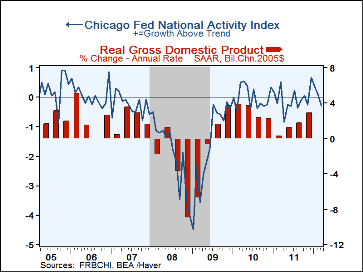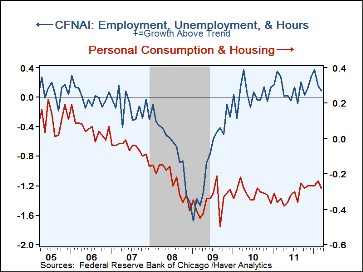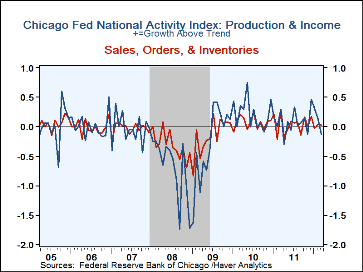 Global| Apr 26 2012
Global| Apr 26 2012U.S. Chicago Fed Index Turns Negative
by:Tom Moeller
|in:Economy in Brief
Summary
The National Activity Index (CFNAI) for March from the Chicago Federal Reserve fell to -0.29 from an upwardly revised 0.07 in February, earlier reported as -0.09. The three-month moving average reversed course last month and fell to [...]
 The National Activity Index (CFNAI) for March from the Chicago Federal
Reserve fell to -0.29 from an upwardly revised 0.07 in February, earlier
reported as -0.09. The three-month moving average reversed course last
month and fell to 0.05, its lowest level since November. During the
last ten years there has been an 81% correlation between the Chicago Fed
Index and the q/q change in real GDP
The National Activity Index (CFNAI) for March from the Chicago Federal
Reserve fell to -0.29 from an upwardly revised 0.07 in February, earlier
reported as -0.09. The three-month moving average reversed course last
month and fell to 0.05, its lowest level since November. During the
last ten years there has been an 81% correlation between the Chicago Fed
Index and the q/q change in real GDP
A negative read of production & income and a lower employment, unemployment & hours figure accounted for the deterioration. The personal consumption & housing reading remained negative while sales, orders & inventories held at a minimally positive level. The Chicago Fed reported that forty of the 85 individual indicators made positive contributions to the index in March while 45 made negative contributions.
The CFNAI is a weighted average of 85 indicators of national economic activity. It is constructed to have an average value of zero and a standard deviation of one. Since economic activity tends toward trend growth rate over time, a positive index reading corresponds to growth above trend and a negative index reading corresponds to growth below trend.
The Chicago Federal Reserve figures are available in Haver's SURVEYS database.
| Chicago Federal Reserve Bank | Mar | Feb | Jan | Mar'11 | 2011 | 2010 | 2009 |
|---|---|---|---|---|---|---|---|
| CFNAI | -0.29 | 0.07 | 0.38 | 0.52 | -0.06 | 0.00 | -1.62 |
| 3-Month Moving Average | 0.05 | 0.37 | 0.25 | 0.16 | -- | -- | -- |
| Personal Consumption & Housing | -0.28 | -0.24 | -0.27 | -0.34 | -0.32 | -0.32 | -0.36 |
| Employment, Unemployment & Hours | 0.09 | 0.16 | 0.37 | 0.27 | 0.12 | 0.04 | -0.82 |
| Production & Income | -0.13 | 0.12 | 0.31 | 0.30 | 0.09 | 0.22 | -0.27 |
| Sales, Orders & Inventories | 0.03 | 0.04 | -0.03 | 0.29 | 0.04 | 0.07 | -0.16 |
Tom Moeller
AuthorMore in Author Profile »Prior to joining Haver Analytics in 2000, Mr. Moeller worked as the Economist at Chancellor Capital Management from 1985 to 1999. There, he developed comprehensive economic forecasts and interpreted economic data for equity and fixed income portfolio managers. Also at Chancellor, Mr. Moeller worked as an equity analyst and was responsible for researching and rating companies in the economically sensitive automobile and housing industries for investment in Chancellor’s equity portfolio. Prior to joining Chancellor, Mr. Moeller was an Economist at Citibank from 1979 to 1984. He also analyzed pricing behavior in the metals industry for the Council on Wage and Price Stability in Washington, D.C. In 1999, Mr. Moeller received the award for most accurate forecast from the Forecasters' Club of New York. From 1990 to 1992 he was President of the New York Association for Business Economists. Mr. Moeller earned an M.B.A. in Finance from Fordham University, where he graduated in 1987. He holds a Bachelor of Arts in Economics from George Washington University.
More Economy in Brief
 Global| Feb 05 2026
Global| Feb 05 2026Charts of the Week: Balanced Policy, Resilient Data and AI Narratives
by:Andrew Cates








